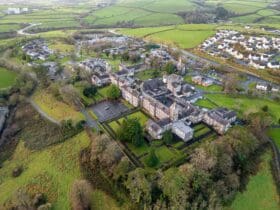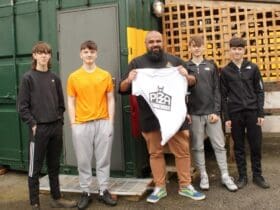On 23rd January the BBC will air a Horizon documentary called “Let’s talk about death” focusing on people with incurable conditions and the treatment decisions they need to make. The programme will feature local cancer patients, clinicians and researchers.


Julie Hepburn, 64 from Newport, is one of the patients who features in the programme. She started feeling unwell on Christmas Day, a week after retiring in 2013. “I thought it was a winter sickness bug giving me diarrhoea, vomiting and stomach pain, but it kept recurring,” she said. “I went to the GP immediately on return from a three-week retirement holiday in Cyprus. I didn’t think it was anything serious at first but being referred on the Urgent Suspected Cancer pathway to a colorectal surgeon did change my mind.”
Julie had tests which showed that bowel cancer was present and underwent emergency surgery two weeks later. The cancer was stage three and had gone through the bowel wall, but fortunately had only infected one lymph node. Six sessions of chemotherapy followed at Velindre Cancer Centre in Cardiff after which she was told there was ‘no evidence of disease’.
“I was very pleased to receive this news,” she said, “but also aware that 40% of people with this stage of bowel cancer would not survive past the five-year mark, so I wasn’t yet ‘out of the woods.’ Once I felt well enough, I wanted to do something positive with my retirement and decided to become involved as a lay representative in cancer research.”
Lay representatives are members of the public – often patients or carers – who work with researchers to improve their work. This includes, for example, working with research funders to prioritise research, offering advice as members of a project steering group, commenting on and developing research materials or undertaking interviews with research participants.
Julie continued, “I started by becoming a lay reviewer for research proposals through the National Institute of Cancer Research and then discovered the Involving People Community in South Wales which advertises opportunities for lay representatives every week on the Health & Care Research Wales website. Now, three years later, I sit on several Trial Management Groups and Steering Committees in the cancer field in South Wales plus a couple of groups in England including a NICE Guideline Committee for Colorectal Cancer. I get a tremendous amount of satisfaction from the work I do providing the patient viewpoint on committees alongside professionals in the field. I feel that I am doing something very useful as well as using the skills I developed in my working life.”
One of Julie’s major roles is as a Research Partner for the Wales Cancer Research Centre’s Translational Theme. Translational Medicine covers the part of the research linking laboratory discoveries to the patient and also feeds the knowledge gained from treating patients back into the laboratory to help develop the science further.
Professor Richard Adams co-leads the centre’s translational research. He said:
“It is so important for us, as researchers, to work with members of the public. We don’t want patients to just be the subjects of research – we want to work with them to improve our work. Ideally we create a synergy that answers important medical questions that mean something to the whole team, with the patient very much at the centre of that team. People like Julie are invaluable in helping us achieve this.”
One example of translational research is the BICCC trial (Brief Intervention with Cyclophosphamide in patients with Colorectal Cancer who have completed treatment). This trial will test a drug which is hoped to produce an immune response in stage three cancer patients following their treatment. If successful, this will help these patients to fight off any microscopic cancer cells still circulating after treatment, and hopefully improve their five-year survival, which currently stands at 60%.
Professor Andrew Godkin, Chief Investigator on the study said:
“I am delighted that we are setting up this trial in intermediate stage colorectal cancer. We are targeting patients who have completed treatment (surgery with or without adjuvant chemotherapy) to receive a short cycle of very low dose cyclophosphamide for four weeks. The intention is to prevent recurrence of colorectal cancer, building on a trial completed last year showing the benefits of cyclophosphamide in more advanced disease. We hope to complete the trial paperwork and start recruiting patients to the trial in late spring / summer 2019.”
Julie worked with Prof Godkin to help to develop the lay summary for this trial in 2016 and was offered a chance to try the drug as a case study. Taking the drug meant she could test the immune response of someone who has had stage three bowel cancer. “I was really pleased to have been given the opportunity and took the drug in 2017, three years after my cancer surgery. The drug had no side effects (unlike chemotherapy) and the blood test showed a very positive immune response. I heard this year that my results had been shown to a pharmaceutical company which had resulted in additional funding being given to the project. I was delighted to have played a part in gaining support for the research to go ahead and I am now looking forward to being a member of the Trial Management Group when the project starts.”







Leave a Reply
View Comments